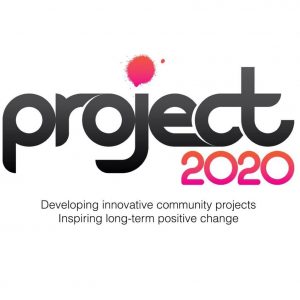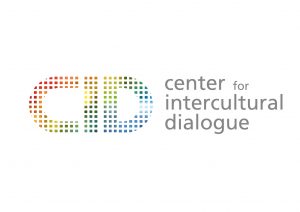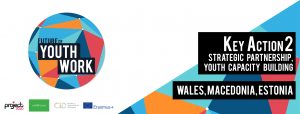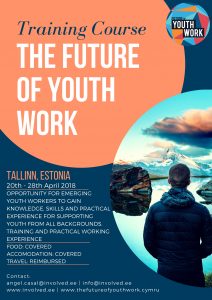The Future of Youth Work
Strategic partnership project between The UK, Macedonia and Estonia and provides a platform for exchange of good practices among organizations active in the youth field, experienced in using educational tools for supporting young people’s development as individuals and members of the society.
The project builds upon the past experiences of organizations from different countries and seeks to utilize the results of their work in the best way possible, through creating partnership that will be based on sharing successful methodology, reflecting on practice and developing new and innovative tools that can be widely used in the youth field in Europe.
Project site: here
Project objectives
The main aim of this project is to provide an opportunity to emerging youth workers to gain knowledge, skills and practical experience necessary for supporting youth especially those from marginal backgrounds (ethnic minorities, low income families, etc.), vulnerable situations (disabilities, linguistic barriers, etc.) and NEET’s (not in employment, education and training). The project will contribute to the professional development of a group of youth workers in education and/or training in Macedonia, Estonia and the United Kingdom through involving them in training and practical working experience in both countries as well as through developing tools both off and online that they can use in their future work in this field. One of the major aims of the collaboration is the development of accreditation and recognition of professional youth work in the UK, Estonia and Macedonia as well as Europe and even on a Global context.
Projects outputs
Online learning platform
The intellectual outputs that brings a particular innovation to this project is the online learning platform. This platform (Moodle) will serve as a basis for sharing and exploring the methodologies and their impact on the target group, but also as a supporting learning tool for the youth workers involved in this project. Throughout the years, we have noticed that in Europe there is a great lack of long-term international trainings for youth workers. Unfortunately, professional youth workers gain their intercultural skills and competencies by participating in random training activities, with a very limited space for follow-up and sustainable work.
This project not only provides such unique learning opportunity to a group of youth workers, but it also pioneers in establishing a learning tool that can be used by them over a period of 24 months. While the online platform will be focused on the educational approaches in youth work, it will also cover general aspects of youth work and thus it will be used by the involved youth workers as a reference for their constant growth in this field. In the same time, the platform will be used by the project team, the international team the future KA1 activities, and by organizations’ more experienced youth workers to provide an on-going learning support to the participants. Furthermore, the platform will be also open for other youth workers from throughout Europe who will be able to benefit from the digital exchange of expertise and experience.
Activities:
1. First transnational meeting (Cardiff, Wales) – 12.-15.01.2018
2. Training course for 21 youth workers from the United Kingdom, Estonia and Macedonia (Estonia, 20.-28.04.2018)
3. Long-term mobilities (2 months) of youth workers (2 participants in UK, 2 in Macedonia, 2 in Estonia) before the 10 month long-term mobilities.Organization sends one youth worker per country: CID Macedonia sends 1 youth worker in the UK, Project2020 CIC and 1 youth worker in Estonia, Involved. The mobilities should be simultaneously ongoing, and should happen from May 1st – June 30th, 2018
4. Second transnational meeting (Kumanovo, Macedonia) – beginning of July, 2018 (mid-term evaluation)5. Long-term mobilities (10 months) of youth workers (2 participants in UK, 2 in Macedonia, 2 in Estonia)
The mobilities should be simultaneously ongoing, and should happen from September 1st 2018– June 30th, 2019.
5. Online learning platform
6. Final multiplier events in the UK, Macedonia and Estonia to present the tools and other forms of intellectual output including a film developed over the whole project, physical publication of toolkit / manual and official publication of online learning platform. June, 2019, as a final event for every 10-month mobility. Ideally, the events would happen simultaneously and live streaming will be embedded within the FB page of the event.
7. Third transnational meeting (Tallinn, Estonia) – end of July/ beginning of August, 2019 (final evaluation)
Partners:
Project 2020 CIC (Wales)
Project 2020 is a not-for-profit organisation based in Wales. We are a collective extended family network comprising network of mentors, youth and community workers, trainers and creatives. volunteers consultants. We collaborate to produce innovative community projects, assist with funding, design deliver issue based workshops and offer consultancy service. Programmes

Center for Intercultural Dialogue (CID) (Macedonia)
Center for Intercultural Dialogue (CID) is a civil society organization working to promote intercultural acceptance and active citizenship through capacity building processes, education and youth work. Our mission is to ensure sustainable community development by creating opportunities for quality engagement of civil society, advancing learning opportunities, and active involvement of young people and other citizens.

Involved MTÜ (Estonia)
INVOLVED is non-governmental organization aiming at creating possibilities for life-long learning and fostering development of individuals and different targets on local and international level. Via broadening horizons, developing practical skills and offering information and activities, we aim at more active participation in civil society. Involved is interested in and active at youth mobility projects and development of youth and voluntary work, intercultural learning, integration and migration, equal and human rights.
Project is funded by Erasmus+ Key Action 2 strategic partnership programme.


